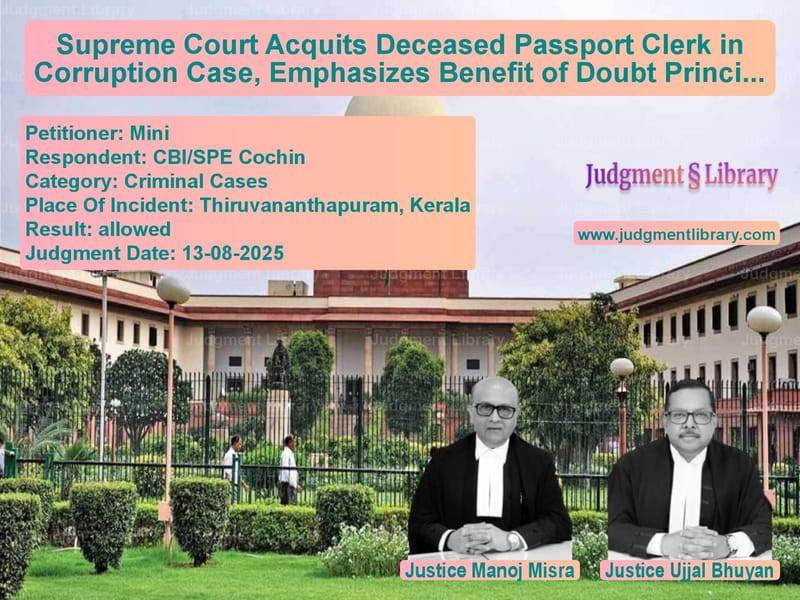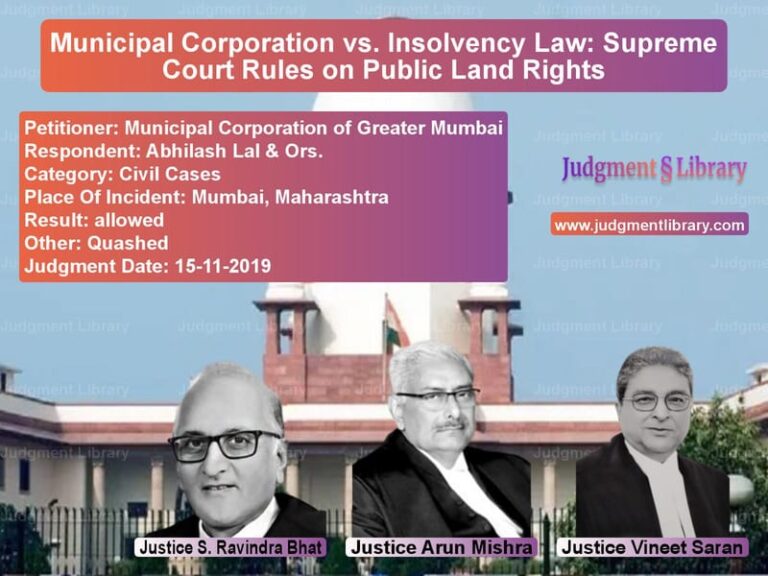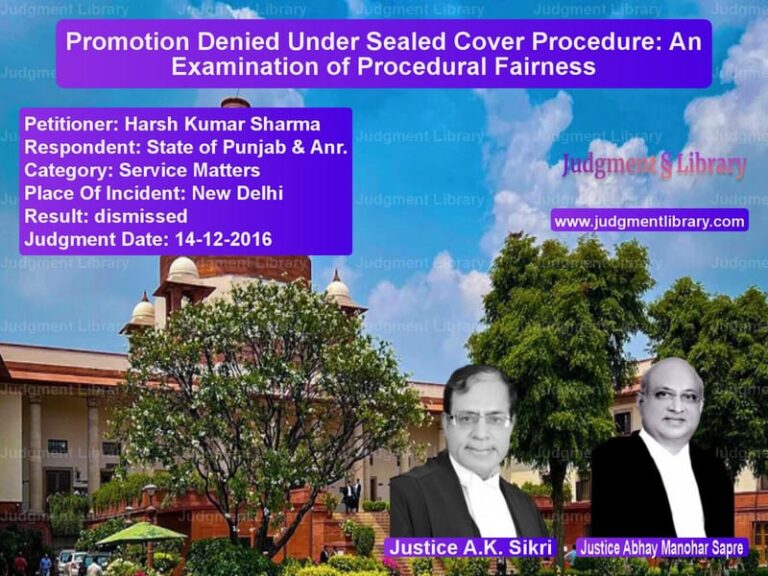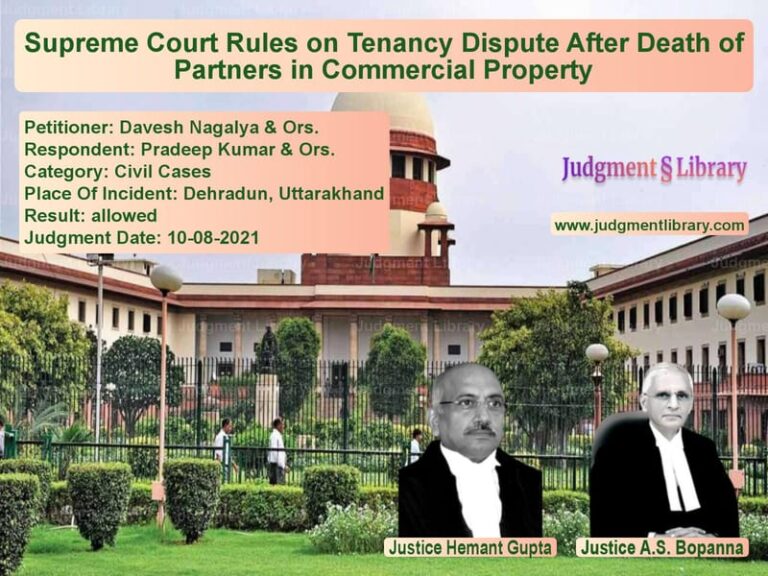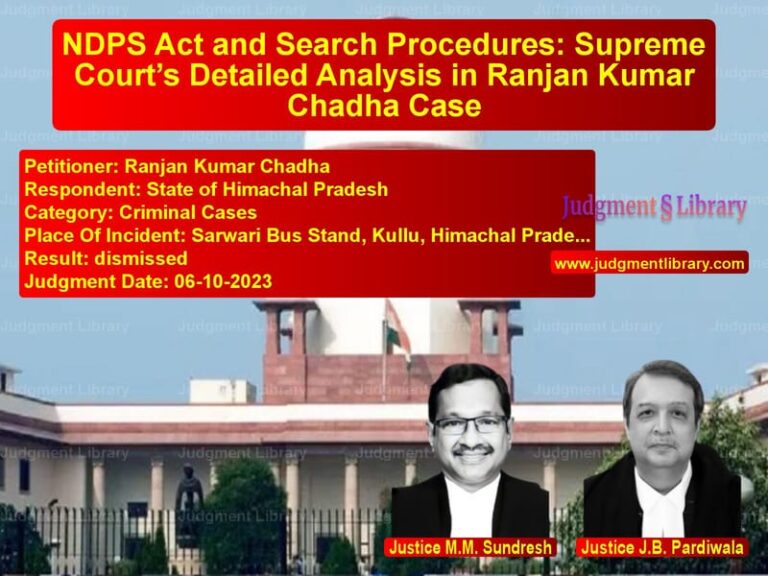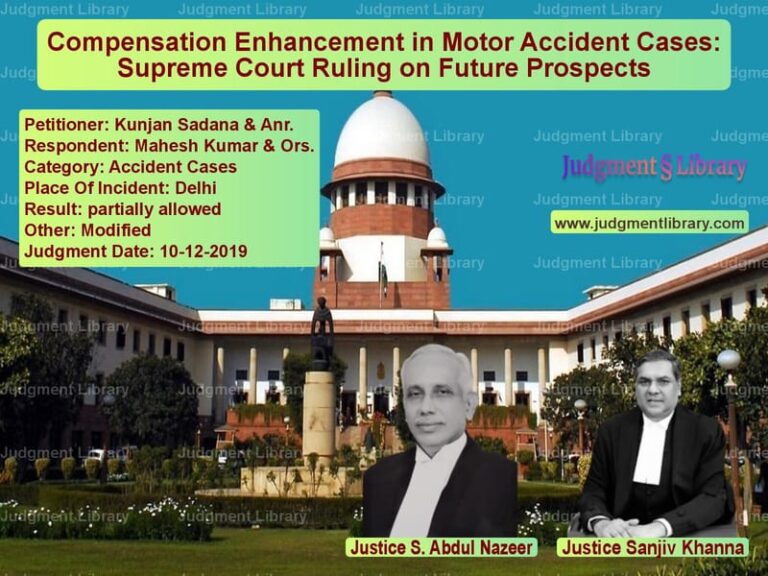Supreme Court Acquits Deceased Passport Clerk in Corruption Case, Emphasizes Benefit of Doubt Principle
In a significant ruling that underscores the importance of benefit of doubt in criminal jurisprudence, the Supreme Court of India has acquitted a deceased passport office clerk who had been convicted in a corruption case, bringing closure to a legal battle that spanned over two decades. The case, which reached the apex court through the widow of the convicted official, raises fundamental questions about the standard of proof required in corruption cases and the court’s duty to carefully consider the accused’s defense.
The Case Background
The matter originated from events in 2003 when Mohanachandran N.K., a lower division clerk at the Passport Office in Thiruvananthapuram, was accused of demanding a bribe of Rs. 500 from a passport applicant for expediting his application. The prosecution case alleged that the accused had asked the complainant to pay Rs. 1,000 towards the legitimate passport fee and an additional Rs. 500 as illegal gratification. After negotiation, the amount was reportedly settled at Rs. 200 as initial bribe payment, with the balance to be paid later.
The Central Bureau of Investigation (CBI) laid a trap, and on June 16, 2003, the complainant handed over Rs. 1,200 to the accused at his residence, which included Rs. 1,000 as legitimate fee and Rs. 200 as bribe money. The accused was immediately apprehended, and his hand wash was collected as evidence. However, during the trial, the case took an unexpected turn when the original complainant turned hostile and did not support the prosecution’s version regarding the demand for bribe.
The Legal Battle
Despite the complainant’s retraction, the Trial Court convicted the accused under Sections 7, 13(1)(d) read with 13(2) of the Prevention of Corruption Act, 1988. This conviction was subsequently upheld by the Kerala High Court in 2020. The matter then reached the Supreme Court through a special leave petition filed by the accused’s widow after his demise.
The Appellant’s Arguments
The appellant’s counsel presented compelling arguments challenging the conviction. “The submission on behalf of the appellant is that the Courts below have not properly appreciated the evidence as well as the defense of the accused set up in his statement made under Section 313 of the Code of Criminal Procedure, 1973.”
The defense had a specific explanation: “under Section 313 the accused had explained the incriminating circumstances by stating that PW1 had approached him through an advocate for help in obtaining the passport. In that context, the accused had decided to help him and on 16.06.2003 the complainant came to the house of the accused along with the prescribed fee of Rs.1000 and documents necessary for issuance of a passport. This was received and kept by the accused under the belief that it was prescribed fee amount only. At that time, accused was not aware that between two Rs.500 denomination currency notes there were two Rs.100 denomination currency notes.”
The counsel emphasized the legal principle that “once the demand is not proved, and Rs.1000 were in any case to be paid towards passport fee, the recovery of that amount by itself would not be incriminatory. In such circumstances, it was a fit case where the accused ought to have been acquitted and, in any event, given the benefit of doubt.”
The CBI’s Counter-Arguments
The CBI, represented by Mrs. Sonia Mathur, Senior Advocate, argued for sustaining the conviction. “Per contra, on behalf of the CBI it has been argued that even if the complainant does not support the prosecution case, or turn hostile, during trial, if it is proved that the complainant had lodged a complaint complaining demand of bribe from him by the accused and, thereafter, money is received by the accused, conviction can be sustained by relying on circumstances that establish demand.”
The prosecution relied on independent witnesses: “It has been argued on behalf of the CBI that PW2, who is an independent witness, has proved that there was recovery of the tainted money from the accused. PW3 also corroborates the aforesaid fact, and both PW2 & PW3 have proved that the complaint was lodged by PW1. Therefore, even if PW1 turned hostile, insofar as demand is concerned, the demand stood proved.”
The Supreme Court’s Analysis
The bench comprising Justice Manoj Misra and Justice Ujjal Bhuyan delivered a meticulously reasoned judgment that carefully examined the evidence and legal principles involved.
The Court acknowledged the legal position that “there can be no quarrel with the proposition that demand can be proved by circumstances even if the original complainant does not in so many words supports the prosecution case during trial.” However, the Court found that in this particular case, the evidence did not meet the required standard of proof.
Read also: https://judgmentlibrary.com/supreme-court-quashes-dowry-case-against-father-in-law-after-divorce/
The judgment highlighted a crucial aspect of the complainant’s testimony: “in paragraph 20 of the impugned judgment, the High Court has noticed the statement of PW-1 wherein he stated that he was misled by one person, who was employed in the CBI, that the accused was a corrupt person and even though several attempts were made by the CBI to trap him, they were not successful. That person sought assistance of PW1 to trap the officer. In our view, when this was the statement of PW1 courts were required to be circumspect in evaluating the evidence.”
The Critical Defense Under Section 313 CrPC
The Supreme Court placed significant emphasis on the accused’s statement under Section 313 of CrPC, which allows an accused to explain incriminating circumstances. “It is well settled that statement of the accused explaining the incriminating circumstances is to be considered before recording conviction and where the explanation is plausible and appropriately explains the incriminating circumstances, it may be accepted.”
The Court found the defense particularly compelling in the context of the facts: “In the present case, we find that the complainant himself had approached the accused for seeking his help for a passport. Admittedly, out of Rs.1200 paid, Rs.1000 were towards passport fee and, therefore, was not bribe money. Demand for the bribe is not supported during trial. In such circumstances, the defense of the accused that he agreed to help the complainant because he was introduced by an advocate, and that he was not aware that Rs.200 has been added to Rs.1000, which was the lawful amount payable towards passport fee, ought not to have been brushed aside.”
The Burden of Proof in Corruption Cases
The judgment clarified the essential ingredients required to establish a corruption offense: “More so, because if the complainant had offered to the accused only the lawful fee payable for processing the passport, no offence was committed. To make out an offence there had to be cogent proof of demand. In the instant case, the complainant has not supported demand and insofar as receipt of extra Rs.200 is concerned, there was no reliable evidence.”
The Court noted the absence of crucial evidence: “Importantly, other than PW1, who was not wholly reliable, prosecution brought no evidence that when the money was accepted by the accused, he had counted the money or that the money was counted in front of the accused before handing it over to him.”
The Final Ruling and Legal Principles
In its concluding observations, the Supreme Court stated: “Therefore, in our view, this was a fit case where benefit of doubt had to be given to the accused.” The Court allowed the appeal and set aside the judgments of both the High Court and the trial court, declaring that “The accused who is no more alive, shall be treated as acquitted of all the charges for which he has been tried.”
This judgment serves as an important reminder of several fundamental principles of criminal jurisprudence. First, it reinforces that the benefit of doubt must always be given to the accused when the evidence is not conclusive. Second, it emphasizes that courts must seriously consider the defense put forward by the accused under Section 313 CrPC, especially when it provides a plausible explanation for the alleged incriminating circumstances. Third, it underscores that in corruption cases, mere recovery of money is insufficient to establish guilt—there must be cogent evidence of demand and acceptance of illegal gratification.
The ruling also highlights the human cost of prolonged legal battles, as the accused in this case passed away during the pendency of the appeal, with his widow having to continue the fight to clear his name. The Supreme Court’s decision brings finality to this long-standing legal dispute while reaffirming the foundational principles of justice and fair trial in the Indian criminal justice system.
Petitioner Name: Mini.Respondent Name: CBI/SPE Cochin.Judgment By: Justice Manoj Misra, Justice Ujjal Bhuyan.Place Of Incident: Thiruvananthapuram, Kerala.Judgment Date: 13-08-2025.Result: allowed.
Don’t miss out on the full details! Download the complete judgment in PDF format below and gain valuable insights instantly!
Download Judgment: mini-vs-cbispe-cochin-supreme-court-of-india-judgment-dated-13-08-2025.pdf
Directly Download Judgment: Directly download this Judgment
See all petitions in Fraud and Forgery
See all petitions in Bail and Anticipatory Bail
See all petitions in Money Laundering Cases
See all petitions in Extortion and Blackmail
See all petitions in Attempt to Murder Cases
See all petitions in Judgment by Manoj Misra
See all petitions in Judgment by Ujjal Bhuyan
See all petitions in allowed
See all petitions in supreme court of India judgments August 2025
See all petitions in 2025 judgments
See all posts in Criminal Cases Category
See all allowed petitions in Criminal Cases Category
See all Dismissed petitions in Criminal Cases Category
See all partially allowed petitions in Criminal Cases Category

